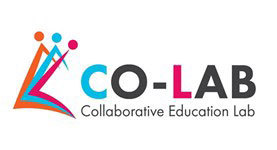
CO-LAB is a forward-looking project focused on making collaborative teaching and learning a reality in the classroom. Being able to collaborate effectively is a valuable 21st century skill. CO-LAB provides practitioners and policy makers with a dedicated space and time to better understand what collaborative teaching and learning means in terms of policy and practice.
The NCCA is a partner in the CO-LAB project and is working with schools, teachers, teacher educators and policy-makers on collaborative teaching and learning, using digital portfolios as a collaboration tool.
CO-LAB aims to:
- Design as well as enrich existing collaborative teaching and learning scenarios and train teacher trainers, student teachers and teachers to implement them
- Allow teachers to test these scenarios in the classroom and report back concerning the enablers and obstacles they faced
- Evaluate the process and define how education policy frameworks could be adapted to better support collaborative teaching and learning in the classroom
CO-LAB’s expected achievements are to:
- Make a considerable contribution to capacity building through collaborative teaching and learning scenarios and a MOOC training teachers how to most effectively use these, all of which will be made available as Open Educational Resources
- Impact on national and European policy development on collaborative teaching and learning through evidence-based results
- Help to mainstream effective collaborative teaching & learning in schools through the project’s final recommendations.
CO-LAB Reports:
A suite of resources will be created as a result of this project and these publications will provide advice and guidelines for implementing collaborative teaching and learning scenarios in classrooms. Please click on the link below to access the relevant support.
CO-LAB Country Report: This country report offers a unique insight into the experience of implementing collaborative learning and teaching in the six partner countries: Austria, Belgium-Flanders, Estonia, Ireland, Poland and Portugal.
Final Evaluation and Recommendations Report: This report evaluates the results of the CO-LAB project and on the basis of this evaluation formulates several policy recommendations.
Code of Conduct for effective collaboration in European projects: This report provides a framework for the management and promotion of collaborative learning environments to strengthen education strategies at local, regional, national, European and international levels.
Integrating Collaborative Learning in Policy and Practice: This summary report is in two parts. The first part gives a general description of the project, the methodology, definitions and linked resources and reports. The project recommendations are shared on Part two.
CO-LAB Guidelines for Assessing Collaborative Learning in the Classroom: Through the lens of the Co-Lab scenarios, these guidelines provide information on three key points: the purpose of assessment, what to assess and how to assess.
There are a suite of country videos from each of the partner countries, which comprise interviews with students, ITE providers, educators and policy makers. These interviews highlight a variety of perspectives, examples and recommendations on implementing collaboration in teaching, learning and assessment.
The CO-LAB MOOC will train teachers, teacher trainers, and student teachers across Europe in how to integrate Collaborative Teaching and Learning into the 21st century classroom. The MOOC will be online from 25th September until 8th November 2017, and will be available as a self-study resource after this date. You can access the Co-Lab MOOC here.
CO-LAB (December 2015 – January 2018) is coordinated by European Schoolnet (a network of 31 Ministries of Education aimed at bringing innovation in teaching and learning to key stakeholders within the education community), and funded by the European Commission’s Erasmus+ Programme. The project’s partnership is rich and diverse consisting of Ministries of Education, teacher training organisations and research institutes from Austria, Belgium, Estonia, Ireland, Poland, and Portugal. Each of these countries has recruited teacher trainers, student teachers, teachers, head teachers, policy makers and other relevant stakeholders at national level to participate in the project.
The National Council for Curriculum and Assessment held the first Digital Portfolios and Collaborative Learning Conference on Tuesday 17th May, at the Conference Centre, George’s Hall, Dublin Castle.
Representative teachers from all of the schools involved in this project were in attendance and were introduced to this European project supporting collaborative teaching and learning by Majella O’Shea, Director Curriculum and Assessment, NCCA.
The first workshop was delivered by Dr. Michael Seery, Reader in Chemistry Education at University of Edinburgh, on “Documenting student learning with e-portfolios”. The second workshop was delivered by Dr. Deirdre Butler, Senior Lecturer in Education at St. Patrick’s College, DCU, on “Embedding Collaborative Learning in Lesson Design”. A third workshop was also delivered with a focus on helping the attendees further develop the digital skills they would need for this project.
You can view videos of the presentations through the links below.

